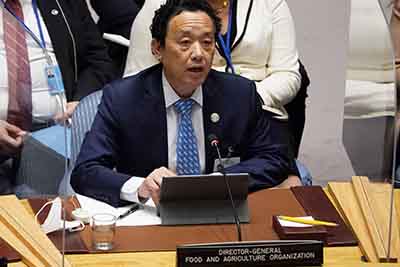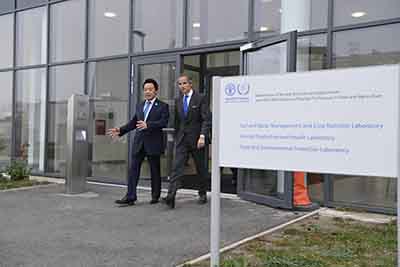FAO in Review: Leveraging partner strengths to transform agrifood systems
FAO Director-General QU Dongyu. Closing Ceremony of the World Food Forum. © FAO/Victor Sokolowicz
The world continues to face increasing challenges – crisis after crisis – that are combining to threaten global food security. This has demonstrated the fragility and interconnectedness of global agrifood systems, and the need to make them more resilient and sustainable.
The critical need for FAO’s expertise and contributions today is clear. However, the sheer scope of current global challenges means that we can only succeed if we work together – through partnerships at different scales, across different sectors and at all levels.
Longstanding partnerships are critical
FAO has a number of traditional, established and long-standing partnerships that add significant value to our work.
Smallholder family farmers, who produce most of the world’s food, are the most food insecure – and they are key to ending hunger and poverty and to achieving more sustainable agrifood systems. Within the framework of the UN Decade of Family Farming, FAO and the International Fund for Agricultural Development (IFAD), together with other partners, have supported the development of National Action Plans for family farming, which have been approved in 11 countries, along with 185 policies, laws and regulations which have been endorsed.
FAO, likewise, supports Indigenous Peoples’ traditional food systems as critical game-changers for the transformation of global agrifood systems. Through partnerships such as the Global Hub of Indigenous Peoples’ Food Systems, FAO and partners support and utilize ancestral knowledge to inform research and policy agendas, while ensuring that indigenous peoples’ knowledge and rights remain at the core and their food systems are valued and protected.
Academia and research institutions can catalyze capacity development through supporting research, innovation and interdisciplinary knowledge-sharing. For example, we are working with Wageningen University & Research to upscale the use of innovative and sustainable approaches for improving lives, while safeguarding natural resources.
Parliamentarians are also important longstanding partners who play a key role in setting policies and regulations at the country level to help those most in need. Through our support to 45 Parliamentary Alliances against Hunger and Malnutrition, FAO is helping to position food and nutrition at the highest of political agendas.
FAO continues to mainstream South-South and Triangular Cooperation throughout the Organization as a highly effective way of working and collaborating to leverage the strengths of our partners. As an example, a highly successful South-South Cooperation project between China and Uganda, supported by FAO, has moved into Phase III, with Uganda agreeing to provide almost USD 10 million for the project in one of the most significant contributions of its kind by a Least Developed Country beneficiary nation.
“Along with our UN partners, academia, civil society and the private sector, FAO is delivering results and achieving impact at scale for the most vulnerable and small-scale producers,” said FAO Deputy Director-General Beth Bechdol.


Left: FAO Director-General QU Dongyu speaks at the Security Council meeting. © FAO/Timothy A. Clary; Right: FAO Director-General QU Dongyu, FAO top officials and IAEA Director-General Mariano Grossi visit the IAEA laboratories. © IAEA/Dean Calma
Private sector engagement is a necessity
The above partnerships have been critical to enable FAO to deliver its mandate effectively, however private sector partnerships have emerged as an important priority to meet the current global challenges.
In 2020, FAO updated its Private Sector Engagement Strategy for 2021-2025, to set in motion new ways of thinking and bringing about transformative change, innovation and measurable impacts. FAO’s private sector engagements aim to scale up collective multi-stakeholder efforts and to provide country-owned and country-led innovative solutions.
“The private sector plays a strategic role as a development partner, offering innovative tools, resources, knowledge and technologies that can reinforce our impact on the ground,” said FAO Deputy Director-General Bechdol.
The private sector is diverse, and FAO has more recently expanded its engagement to include important new actors from all parts of agrifood systems, with a particular emphasis on small and medium-sized enterprises (SMEs) and entrepreneurs, while improving the balance of partners across different sectors and regions. FAO recently launched, in collaboration with the International Agri-Food Network, a pilot Accelerator Mentorship Programme to support women entrepreneurs in addressing challenges and constraints they face in their businesses.
An important platform to support partnerships is the Hand-in Hand Initiative, through which FAO is helping to connect private sector actors with Member countries to support the financing of their agrifood system investment plans. A number of countries have already secured significant funding through the Hand-in-Hand Initiative, including Bangladesh, Ecuador, the Solomon Islands and Zimbabwe.

Northern Bari Payam, Jubek State, South Sudan - FAO distribution of seeds and farming tools to 500 households. © FAO/Mattia Romano
UN collaboration being strengthened
FAO is a strong advocate of the UN Development System reform and is committed to strengthening partnerships with other agencies and organizations across the broader UN System to increase synergies, share knowledge and expertise, and multiply impact on the ground.
FAO’s collaboration with the other UN Rome-based Agencies (RBAs) – the International Fund for Agricultural Development and the World Food Programme (WFP) – remains a key partnership strand. The RBAs regularly coordinate policy responses to the global food crisis, with increased country-level coordination in humanitarian crisis contexts. FAO and WFP co-lead the global Food Security Cluster (FSC), which is focused on enhancing cooperation and partnerships to respond to humanitarian crises.
FAO and the International Atomic Energy Agency (IAEA) recently agreed to intensify ongoing collaborations in food and agriculture using nuclear science and technology through their Joint Centre. A recent joint mission sent seeds to the International Space Station to develop crops able to adapt to climate change on Earth – expanding the existing collaboration to cover space breeding.
At the United Nations in New York, we increased our engagement in the peace and security agenda through the UN Security Council. Conflict remains the main driver of acute food insecurity, and when combined with other shocks, it exacerbates the impact.
Humanitarian assistance alone cannot prevent famine in the long-run, or reverse the rising trend of hunger. It requires a shift to anticipation and prevention. The Global Network Against Food Crises (GNAFC) provides a platform for coordinated and coherent actions, and FAO continues to build partnerships across the UN system in support of these actions.
These are just a few examples of our multi-faceted work with academia, civil society, cooperatives, the private sector, resource mobilisation partners, South-South partnerships and parliamentary alliances. Together we are stronger in our efforts towards the 4 Betters: Better Production, Better Nutrition, a Better Environment and a Better Life, leaving no one behind.
